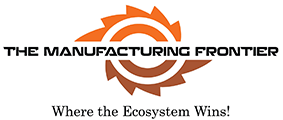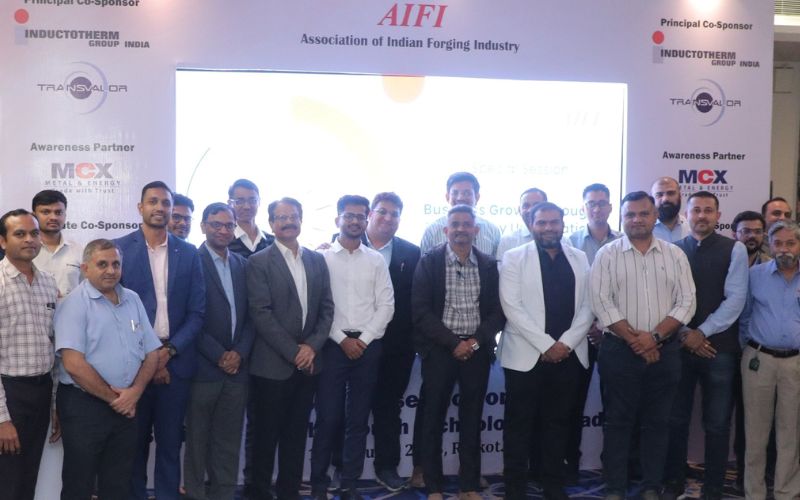“For the Indian forging industry to remain competitive and thrive, it is essential to adopt cutting-edge technologies such as precision forging, additive manufacturing, infrared pyrometers, 3D simulations, advanced die designs with greater tolerance, automation, robotics, and versatile metal forging techniques.” Nayan Shah, Associate Director at PwC India
The Association of Indian Forging Industry (AIFI), the apex body representing India’s forging sector, recently concluded a highly successful session on “Business Growth Through Technology Upgradation” in Rajkot. This event, the third in a series, follows the resounding success of similar sessions held earlier in Pune and New Delhi.
The session witnessed an impressive gathering of industry leaders, experts, and key decision-makers from diverse sectors, including CEOs, COOs, CFOs, Plant Heads, HR Heads, and other functional heads. Attendees engaged in insightful discussions on cutting-edge technological advancements and actionable strategies aimed at driving sustainable business growth within the forging industry.
The inaugural session set the stage with an insightful presentation that delved into the current industry landscape, emerging trends, and opportunities within the forging sector. Key discussions centred around a comprehensive macroeconomic overview of India, priority government sectors, policy-driven initiatives, and the dynamics of both national and international forging and casting markets.
The session highlighted the industry’s rapid growth, propelled by the adoption of cutting-edge technologies and sustainable practices. Noteworthy insights included the burgeoning potential of the aerospace forging sector, the forging industry’s pivotal role in driving Indian Railways’ growth, and a collective focus on environmentally conscious advancements.
Nayan Shah, Associate Director at PwC India, stated, “The global forging and casting market is expected to grow significantly, from $95.84 billion in 2022 to $147 billion by 2032, at a CAGR of 6.3% during the forecast period of 2023-2029. For the Indian forging industry to remain competitive and thrive, it is essential to adopt cutting-edge technologies such as precision forging, additive manufacturing, infrared pyrometers, 3D simulations, advanced die designs with greater tolerance, automation, robotics, and versatile metal forging techniques. Notably, the aerospace forging market is projected to reach $50 billion by 2035, presenting tremendous opportunities. Furthermore, forging will play a transformative role in the rail industry by supporting the manufacturing of critical components required for construction, maintenance, and operations.”
Another session delved into innovative technological solutions aimed at tackling engineering and manufacturing challenges. Discussions highlighted the importance of automatic process optimization, advanced software tools for designing complex geometries, and leveraging cutting-edge technologies to enhance and modernize existing processes. The session underscored the urgent need for India’s forging industry to adapt quickly to an evolving business landscape shaped by rapid technological advancements, geopolitical shifts, and regulatory complexities.
The event also saw an insight on “Energy Derivatives and Price Risk Management”, addressing financial risks, factors influencing the energy market, trends across various markets, risk management strategies, and initiatives from regulatory bodies.
The event concluded with a strong call for collective action to future-proof the Indian forging industry by embracing cutting-edge technologies, fostering a culture of innovation, and addressing critical challenges such as skills mismatch and regulatory complexities. Industry leaders emphasized the importance of adapting to the rapidly changing business environment by aligning with global trends and investing in advanced manufacturing practices. AIFI reaffirmed its commitment to empowering the sector through platforms for knowledge sharing and strategic partnerships that drive sustainable growth.
AIFI’s ongoing efforts to promote technology-driven transformation underscore its dedication to fostering innovation, collaboration, and global competitiveness within the forging industry. By leveraging opportunities presented by government initiatives, technological advancements, and dynamic market trends, the Indian forging sector is well-positioned to play a pivotal role in the nation’s manufacturing revival and contribute significantly to global economic progress.
About the Association of Indian Forging Industry: Established in 1965, the Association of Indian Forging Industry (AIFI) is the strongest, oldest Forging Association with highest members from the industry in India. The Indian Forging Industry has always been a major growth driver of the Indian manufacturing sector and is one of the important industries for the success of automobile, power sector and general engineering in the country. The Association of Indian Forging Industry (AIFI) is the umbrella organization of the forging Industry in India with more than 200 members across India. Its members’ products include rough forgings and/or machined/finished parts like Crankshafts, Connecting Rods, Camshafts, Shifted Fork, Steering Components, Crown Propeller Shafts, Gear Box Components; Crown Wheel and Pinions, Front Axle Beams, Rear Axle Shafts, Earth Moving Link, Suspension parts, CV joint parts, Braking parts, Auto electrical components, Railway Wheel, Flanges/Pipe Fittings, Industrial Valves etc. The forging industry is a major supplier to the auto companies and a critical industry that generates employment.
AIFI has been the spokes body of the Indian Forging Industry for about six decades. It has played a major role in encouraging proactive dialogue between all the relevant stakeholders like the industry and Government (both in terms of suggestions for policy making and problem-solving), as also between the industry and the market (User industries — domestic and global customers.) India is the 2nd largest producer of forgings globally next to China.

